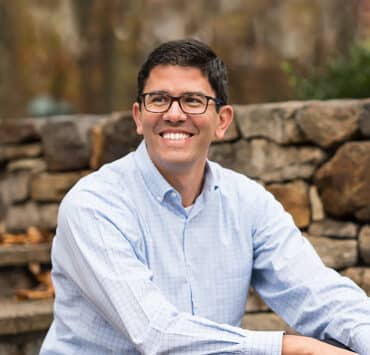|
Getting your Trinity Audio player ready...
|
Carlos Moran Jr. is a photographer, a licensed pilot, a scuba diver, a volunteer for Team Rubicon (a disaster response nonprofit headed up by mostly ex-military professionals) and he just won’t stop taking classes. There is just too much to learn, and too little time.
One of the current chief information security officer at Toppan Merrill’s earliest memories is of standing in his grandfather’s kiosk in Ecuador, watching money change hands and providing all manner of customer service functions befitting a child that could barely see over the counter. It was a foundational experience for all that would follow.
Moran spent significant parts of his early life living between Ecuador and the United States, not entirely sure if either culture accepted him as its own. “On the other hand, those cultural differences helped me to connect with people that have different points of view, whether it’s language, beliefs, or background,” Moran explains. “Understanding those human values is what helps Latinos thrive. It’s one of our superpowers.”

The idea of “Latino Superpowers” comes up frequently with Moran. In a sense, Moran’s struggle to understand the world around him has made him more adept than most at bringing people together, providing empathy, and finding connections where others might see none.
“As a leader, empathy and compassion are so incredibly important,” Moran says. “Latinos have the ability to communicate through storytelling and connection, and I think our struggles and ability to move on from them are part of those superpowers that we possess. There’s a passion that drives us, and it’s helped get me to where I am.”
Staving Off the Inevitable
As the eldest of eleven children, Moran has always seen himself as a protector. He applies the same mentality at Toppan Merrill, a leader in financial printing and communication solutions, where the increasingly complex world of cybercrime is always just on the other side of the door.
Moran has helped guide and strategize the company’s cybersecurity posture, walking the difficult line between ensuring the safety of the company’s assets, while keeping systems as resilient, secure, and operational as possible. He calls this “harmonized business risk/reward,” because constant change makes it essentially impossible to achieve true balance.
In an environment where a cyberattack is a constant threat for any company, Moran says companies need to focus on their weakest link: human error.
“If people haven’t been properly trained and the time hasn’t been invested in their education, you’re putting the whole company at risk,” the CISO explains. “We’ve put a lot of work into cultural change when it comes to dealing with phishing attacks that can occur on a daily basis. Technology is not enough. People are your first, last, and best line of defense.”
Moran says connecting with the broader organization is imperative to ensuring that cultural shift is welcomed. He is frustrated by tech professionals who speak in acronyms when, to him, “simplicity reflects true mastery.”
To help those outside of his department understand how to better ensure cybersafety, cybersecurity must be explained in a way that is neither condescending nor critical. The CISO places a high premium on those who can make genuine connections, and it’s reflected in his team.
Learning to Serve
Moran’s broader leadership is best described as servant based. He remembers cleaning offices with his parents when he was a child, getting home late to do his homework and waking up early for school the next day. While cleaning those offices, he’d make his parents laugh by sitting behind a large desk and pretending to order his family around.
“That was my conception of what leaders did,” Moran says, laughing. “Fortunately, I learned a little bit more as I got older.”
His journey is fascinating precisely because he had absolutely no idea what he wanted to do when he went to college; he didn’t even know if he wanted to go to college. But after asking his guidance counselor what profession made the most money (a definitive consideration for the immigrant and eldest of eleven), he pursued electrical engineering and landed his first job at NASA.
“Technology is not enough. People are your first, last, and best line of defense.”
Carlos Moran
Moran’s career would eventually cross with that of Vinton Cerf, widely considered “The Father of the Internet.” He even met Mexican President, Ernesto Cedillo. But no matter the career highlights, the leader remains devout in giving back to his community.
Moran is on the board of advisors for the Cloud Security Alliance (CSA) for the State of Minnesota where he also served as president. He’s also on the CSA CxO Trust Advisory Council for Cloud Computing and serves as an active member on the advisory board for Minneapolis-based Evanta, an Executive Member of the CyberEdBoard. Beyond that he’s an associate member of the League of United Latin American Citizens (LULAC) and has previously volunteered for the American Red Cross.
Then, there is the whole host of extracurricular activities and the time spent with his own family. Moran says the constant curiosity can annoy family and colleagues alike, but it’s important to him to understand where people’s motivations, desires, and how he can best serve them. Moran is that rare mix of true empathy and technological expertise. He knows millions have shared in his struggles, and he wants Latinos to recognize their own superpowers.
For the security practitioner caught between rapidly evolving threats and demanding executives, IANS is a clear-headed resource for making decisions and articulating risk. It’s through our Faculty, our network of seasoned practitioners, that we provide experience-based insight and guidance for CISOs and their teams.

